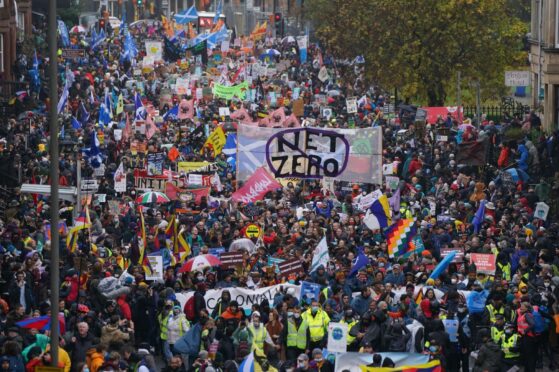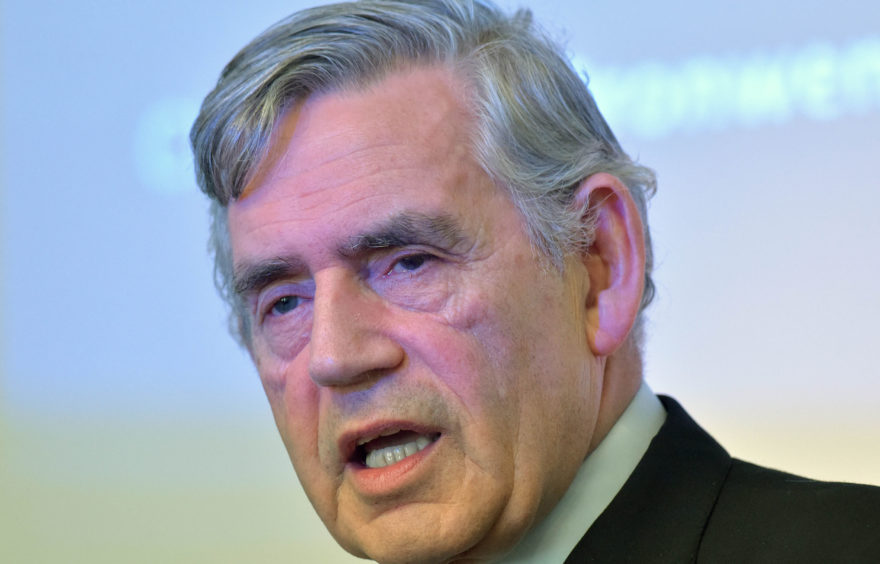
Gordon Brown has blamed the rise in global nationalism for sabotaging efforts to bring countries together to tackle climate change at Cop26.
After assessing the agreement forged at the United Nations summit in Glasgow, the former prime minister believes, while progress has been made, much more could have been achieved to limit carbon emissions and slow global warming.
Observers were critical of the interventions by India, China and others which watered down key commitments to phase out coal and other fossil fuels and voiced frustration at the lack of more binding financial commitments to support the world’s poorest countries worst hit by climate change.
However, writing in The Sunday Post today, Brown says singling out individual countries for criticism misses the bigger issue – an increasing reluctance of countries to work together with common purpose.
He writes: “A greater force is at play here, a surging tide of global nationalism which is affecting almost every country and now washing away the painstaking work of multilateralism.
“Too many nations are now taking such a narrow view of their national interests that they have become free riders on the backs of others and international cooperation, whether on climate or Covid vaccines or nuclear disarmament, has been set back and is in retreat.”
Brown said the 2008 financial crisis had been the trigger for a new wave of international protectionism and immigration controls.
His concern echoes that of former US president Barack Obama. He spoke at Cop26 and described his fears that international cooperation in search of a common good was in decline.
He told delegates gathered at the SEC: “I recognise we’re living in a moment when international cooperation has waned. A moment of greater geopolitical tension and stress in part because of the pandemic, in part because of the rise of nationalism and tribal impulses around the world.
“I understand that it’s harder to get international cooperation when there are more global tensions, but there is one thing that should transcend our day-to-day politics and normal geopolitics. And that is climate change.”
Earlier this year Pope Francis also spoke out about the dangers of rising nationalism, warning humanity “is crumbling and cracking due to myopic and aggressive forms of nationalism and radical individualism”.
Cop26 closed a week ago with the announcement of the Glasgow Climate Pact, but key commitments to phase out coal and fossil fuels were diluted at the last minute while there was frustration over the lack of binding commitments to help poorer nations.
Environmental campaigners expressed dismay over the actions of some world leaders, including those of China, Russia and Brazil for failing to attend the summit in person; India and China over their late stand-off over fossil fuels; and Western leaders for refusing to commit to rigorous financial support packages.
The mounting concern that a new age of nationalism and protectionism around the world is sabotaging international cooperation was echoed by academics yesterday.
Associate professor Alex Stewart, of St Andrews University, who specialises in international cultural and social behaviour and cooperation, said his research found evidence both of growing nationalism and also that it hindered international collaboration.
He said: “I absolutely think there is a rise in nationalism being experienced at the moment, and that it has local and global causes.
“Global causes include people feeling economic anxiety, and this has probably been exacerbated by the pandemic.
“What also happens is that, when these ideas and feelings take hold, they are hard to shift and lead to breakdowns in cooperation, where people cannot do things which perhaps they would like to do or which would be good for them, because attitudes have become entrenched. Therefore, this rise in nationalism is inhibiting greater multilateral cooperation.”
He cited nationalistic attitudes in countries such as Brazil, China, India and Russia as having featured in his research. He said: “President Bolsonaro of Brazil is an obvious example when talking about climate change given the significance of the Amazon region.
“Within the EU, we also have movements in countries such as Hungary, France, Germany, Poland. While these movements are not in power, they are growing in magnitude. Further afield, the Philippines has been cited as becoming more repressive in this regard and, in the US, we had President Trump, the Capitol riots and the storming of Congress.”
A study by academics at the University of Graz, Austria three years ago cited evidence suggesting nationalism was on the increase in some countries, stating: “From the election of Donald Trump to Brexit, the nationalist policies of the Japanese Prime Minister Shinzo Abe, his Indian counterpart Narendra Modi and the Turkish president Recep Tayyip Erdogan, the success of far-right parties in Italian, German and Austrian elections in 2017 and 2018, nationalism appears to be on rise globally.”
Author Florian Bieber concluded that while there was no single global trend, some countries had seen a rise in nationalism.
He wrote: “This trend is neither uniform nor universal. However, this does not signal that there is no reason for concern.
“Further exogenous shocks can increase the significance of nationalism; nationalisms through their inherently confrontational structure can also mutually increase tensions and conflict.
“The democratic backsliding around the world, from Hungary to Turkey, from Venezuela to the United States has repercussions for nationalism. Less democratic regimes are more likely to use nationalism.”

Enjoy the convenience of having The Sunday Post delivered as a digital ePaper straight to your smartphone, tablet or computer.
Subscribe for only £5.49 a month and enjoy all the benefits of the printed paper as a digital replica.
Subscribe © Nick Ansell/PA Wire
© Nick Ansell/PA Wire

